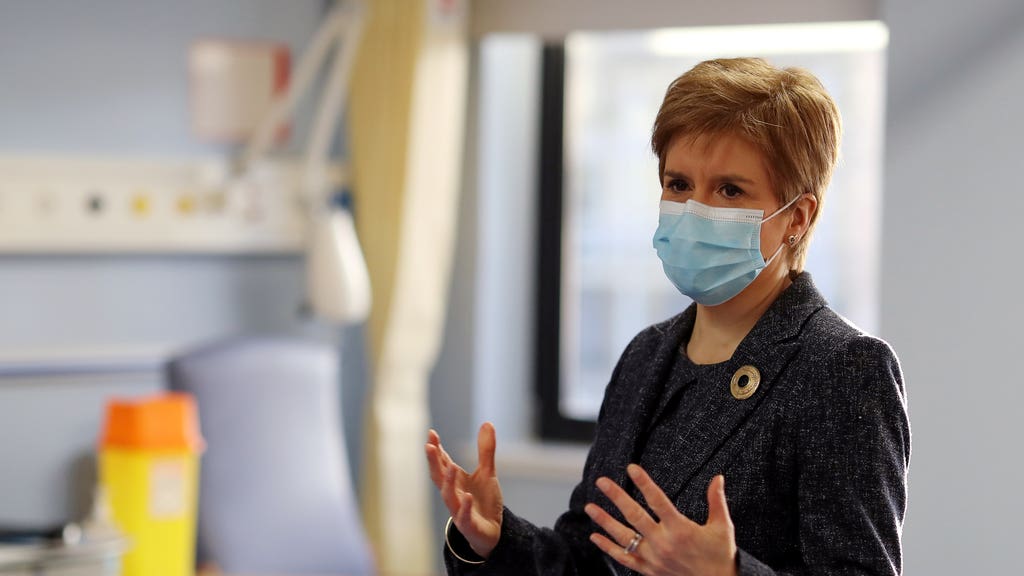A review of the Scottish Government’s response to the Covid-19 pandemic has concluded that “constant changing guidance” caused significant stress and confusion from frontline workers.
The “problematic” messaging on coronavirus rules during the first six months of the outbreak was highlighted in a report based on feedback from government officials, NHS Scotland staff and health board representatives.
The report was published as the latest daily figures from the Scottish Government showed Scotland recorded seven coronavirus deaths and 1250 new cases in the past 24 hours.
It brings the death toll under the daily measure – of people who first tested positive for the virus within the previous 28 days – to 7983.
The report, produced with the aim of learning lessons from the earlier stages of the pandemic, praised some of the government’s communication but found rapid rule changes left the “depleted workforce” with little time to react.
“‘Constant changing guidance’ was described as problematic, with partnerships having to ‘continually flex’ to short timescales, leaving little planning time going with a depleted workforce,” the report stated.
It added: “Colleagues felt that there were occasions when Scottish Government guidance was issued which either contradicted or did not align with Health Protection Scotland guidance, and that this caused significant stress and confusion to local teams on the ground.
“This was exacerbated when several aspects of guidance were felt to be ‘piecemeal’ in collections of letters, often sent out late in the evening or over the weekend with immediate implementation required.
“The risk that much of this got lost was significant given the workload already facing local teams.”
The report also raised some concerns around the supply chain and purchasing of personal protective equipment (PPE) during the first wave of the virus.
It stated: “Despite some local initiatives being reported as successful, many boards expressed ‘anxiety’ around the availability of PPE, ventilators and national stockpiles.
“They have also expressed the fact that there should be clear and consistent messaging regarding the availability and management of PPE, and specialist equipment shortages.”
On the issue of preparedness for a pandemic, the report added: “There were concerns raised regarding the absence of pragmatic checks such as checking if PPE was in date”.
Health bosses told the government staff felt “an overwhelming sense of camaraderie” and insisted the services provided for staff wellbeing “were sufficient”, despite some gaps with access being identified.
Another issue was the “significant challenges around workforce supply” in the health and social care sectors.
Looking ahead, it states: “With increasing new demand presenting during the pandemic, as well as a growing backlog of work postponed in the immediate response, the supply and flexibility of the workforce presents a key challenge to Scotland over the coming months.”
Health secretary Humza Yousaf said: “The Covid-19 pandemic has been the biggest public health crisis in living memory and this report sets out the tremendous work of our health and social care system in meeting this challenge.
“The findings provide valuable insight from the first six months of the pandemic, but the situation has moved on significantly over the past 11 months since that time.
“Our NHS has developed new ways of working while continuing to provide vital treatment and safe patient care.
“The Scottish Government responded promptly to the impact of the pandemic and the huge demand it placed on health and social care staffing, creating a recruitment portal which meant those with relevant skills and experience came forward as quickly as possible to support frontline services.
“We also worked with the NHS, Scottish suppliers, and on a four-nation basis to ensure that Scotland has adequate stocks of PPE and never ran out of supplies, even during the very difficult first phase when global PPE markets became very challenging.
“Over 770 million items of PPE have been delivered to hospitals and primary care and over 350 million items to social care organisations since March 2020.
“Scotland’s response to Covid-19 has been supported by clinical advisory groups across areas like shielding, care homes and clinical guidance among others. We recognise the importance of ensuring guidance is coordinated and consistent and continue to work closely with health and social care stakeholders on this.
“We also acted to provide further support and significantly strengthen oversight of Scotland’s care homes during the pandemic, including governance issues.
“We acted to support the safety and wellbeing of staff and residents through a number of avenues including regular testing, the vaccine programme and additional resources for pandemic related roles and expenditure.”
Meanwhile, the Scottish Government’s daily update on coronavirus statistics shows the test positivity rate is 5.5%, up from 4.9% the previous day.
A total of 367 people were in hospital on Thursday with recently confirmed Covid-19, down from 381 the previous day, with 54 patients in intensive care, down one in 24 hours.
So far, 4,020,712 people have received the first dose of a Covid-19 vaccination and 3,286,153 have had their second.
Follow STV News on WhatsApp
Scan the QR code on your mobile device for all the latest news from around the country


 PA Media
PA Media

























